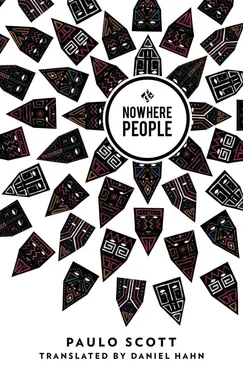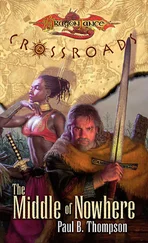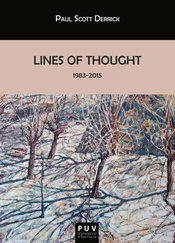Paulo Scott - Nowhere People
Здесь есть возможность читать онлайн «Paulo Scott - Nowhere People» весь текст электронной книги совершенно бесплатно (целиком полную версию без сокращений). В некоторых случаях можно слушать аудио, скачать через торрент в формате fb2 и присутствует краткое содержание. Год выпуска: 2014, Издательство: And Other Stories Publishing, Жанр: Современная проза, на английском языке. Описание произведения, (предисловие) а так же отзывы посетителей доступны на портале библиотеки ЛибКат.
- Название:Nowhere People
- Автор:
- Издательство:And Other Stories Publishing
- Жанр:
- Год:2014
- ISBN:нет данных
- Рейтинг книги:3 / 5. Голосов: 1
-
Избранное:Добавить в избранное
- Отзывы:
-
Ваша оценка:
- 60
- 1
- 2
- 3
- 4
- 5
Nowhere People: краткое содержание, описание и аннотация
Предлагаем к чтению аннотацию, описание, краткое содержание или предисловие (зависит от того, что написал сам автор книги «Nowhere People»). Если вы не нашли необходимую информацию о книге — напишите в комментариях, мы постараемся отыскать её.
Driving home, law student Paulo passes a figure at the side of the road. The indigenous girl stands in the heavy rain, as if waiting for something. Paulo gives her a lift to her family’s roadside camp.
With sudden shifts in the characters’ lives, this novel takes in the whole story: telling of love, loss and family, it spans the worlds of São Paulo’s rich kids and dispossessed Guarani Indians along Brazil’s highways. One man escapes into an immigrant squatter’s life in London, while another’s performance activism leads to unexpected fame on Youtube.
Written from the gut, it is a raw and passionate classic in the making, about our need for a home.
Nowhere People — читать онлайн бесплатно полную книгу (весь текст) целиком
Ниже представлен текст книги, разбитый по страницам. Система сохранения места последней прочитанной страницы, позволяет с удобством читать онлайн бесплатно книгу «Nowhere People», без необходимости каждый раз заново искать на чём Вы остановились. Поставьте закладку, и сможете в любой момент перейти на страницу, на которой закончили чтение.
Интервал:
Закладка:
The woman and his father are not getting along. Donato can’t help them. Henrique won’t leave São Paulo, and it would appear that she has got a job at a university in Rio de Janeiro. Donato thinks it will be good when they swap around the visiting arrangements and he and his father go to spend a bit of time with her in Rio. Donato leaves the owl on his desk and from time to time when he stages a battle between it and another toy the owl always wins. The photo of him with Rener (which he only takes out of the drawer on these occasions) is the referee.
Years later, Luisa and Henrique finally work it out. She moves to São Paulo.
The Rainha trainers are the most basic black indoor-football type. To a lot of his classmates Donato is stuck-up, to others he’s the victim of total brainwashing by a stepfather who’s a Nazi (when they apply this adjective to him, they obviously don’t consider the fact that a Nazi, a Nazi white man, would never adopt an Indian boy). At the age of ten he is probably the only child in his year immune to the consumer temptations typically experienced by his age group. Henrique took every precaution to clarify the meaning of the word capitalism for him, the way it works and is organised, even the psychology behind this term, and the reason why wealth is scarce and human needs unlimited, and how this is the most important rule of all, even if there are fraudsters who promise that it isn’t. His teachers talk a lot about liberty and fraternity; whenever they can they illustrate the economic repercussions of these two choices, Mr Lavirmes is one of the ones who makes a point of not hiding the fact that the school’s pupils are candidates for future leaders of their countries, stressing that it’s no use studying if you don’t know the social implications of what you’re studying. On the whole, this kind of lesson does not mean much to most of the pupils. To Donato, these concepts and explanations make more sense when they coincide with his father’s: when there isn’t enough for everyone it’s necessary to have realistic criteria for dividing up what there is, what you have, what you can get. Price. Donato likes this word — short, direct and reliable — because it is practical and has been a part of his vocabulary forever, he understands what it represents, whether in the supermarket, at the stationer’s, picnicking in the park, on the football pitch, in clothes, on the trips he takes with Henrique around Brazil, in the cars that used to so fascinate him and no longer do, in the shopping he does with Luisa; for weeks the only thing Luisa has done has been to shop. Donato knows many things, but he does not really know what the future is. The future is still Henrique’s choice. Donato knows he needs to learn to think, he knows he needs to study and he needs discipline, he knows intelligence is worthless if you don’t have discipline. Donato doesn’t feel bad and he doesn’t compete and he doesn’t secure alliances with his classmates; he steers clear of the traditional games of hierarchy, of the worldly magnetism of the three or four students who are more confident than he is, the inevitable captains, the rangers who one moment bring the group to a place of perfect harmony, to a companionship that has a muscular concision to it, to an almost martial brusqueness, and the next moment to the worst of discords, to arguments, to progressive stages, to absolute distancing, to acts of revenge and — not to ignore what is merely a statistical likelihood — to real conflict, a fight, a haymaker punch, trip, kick, hook, headbutt, blood. Donato is a zero. Neutral territory. Switzerland. He has become used to being an object of mild curiosity to other people both within and outside school. At his classmates’ birthday parties he would suffer a little when there were other children who didn’t know him and who weren’t quite sure what to do when they came across an Indian. Sometimes it was good and hilarious, at other times less so. Little Rener learned to profit from this socially. Black French girls are at an advantage over Brazilian Indian boys. Donato is the main attraction at her birthday parties, every year she reinvents her friend’s story, about how they met, about him being a kind of shaman who will avenge his people, who is only among the white people to learn how to master them, practically a Buddha (her mother is a Buddhist and she knows everything about the religion), an Avenging Buddha. Donato is horribly embarrassed but, playing along as best he can with Rener’s pathological need to embellish, he appears each time in the most exotic outfit he can manage. This time, they agreed, he would wear a dark suit, white shirt, red tie and a badge saying ‘ASK ME HOW’. Rener is in a pink dress. Someone commented that the only thing missing was a garland of flowers in her hair and another said that it wasn’t a birthday, it was a wedding. Neither Henrique nor Rener’s parents suspected the little performance that their children put on every year, but Luisa noticed their arrangement and kept their secret. It was she, in fact, who hired the suit when Donato asked her to. She knows he is a boy of few words, she knows that when he speaks them he pronounces each one as correctly and emphatically as he can, an impostor playing the role of child (prevaricating in between lapses to hide his reptilian failure to take off). He is condemned to a process of rigorous selection, down to the very commas; condemned to calibrating the air in his lungs, to their tightening, so precociously familiar with the pressures of an extensive vocabulary, because rarities are to hand much more readily than the copious babble of the day-to-day. And this is nature playing one of her dirty tricks. When he started to stutter (almost at the same time as he decided not to) he realised that the everyday was his worst enemy. His whole body seemed to resist what should have been elementary, a simple occurrence; in order to tame it he needed to take it by surprise, use routes that caused shock, surprise, and hope that this surprise might be quicker and more dynamic than the bluntness of his tongue and his brain, his diaphragm and his hands. His hands. He heard it on a tv programme once: only people who are insecure or those who are not very persuasive need their hands to express themselves, to get where they want. Donato needs his hands, but he won’t allow himself any shortcuts, he’s sure Henrique wouldn’t allow them either. Donato devotes himself to difficult words and generally to whatever is difficult, that is where his levers are; he almost never found them when he was a child. At Rener’s parties, he hardly talks to people (his stammering is not revealed), he lets his friend talk for both of them. Those who already know him, already familiar with the dynamics of the games, just help out here and there, supplying the attention necessary to make the story invented by the famous Brown Sugar a bit more credible. At the end of the party, dressed as bride and groom, as the others said, the two of them laugh at themselves, she hugs him and promises that one day they will own a circus troupe, and he just promises that he’ll fix something even more striking for next year. Everything is yet to come.
Resignation. Separation. The three of them at the table in the flat in São Paulo. Luisa and Henrique are arguing more than ever. Donato thinks Luisa is always trying to compete with Henrique (and he thinks this is fair), but he doesn’t really understand too well what is happening between the two of them. And the argument is all set to become a row. Luisa is trying to persuade Henrique not to invest everything they’ve got in this project he has invented and which has been dragging its heels, in terms of financial return, since ninety-six, when the internet was still feeling its way into the world and even more so in Brazil, when the global network of computers was a curiosity orbited by shots in the dark (it was not long since access had become available on a commercial scale, it was not long since the green-and-black screens had been abandoned and the graphic possibilities for interaction via monitor had expanded). His idea was to create a ‘ hub for distributing specialised information, on a subscription basis, to corporations, social groups, new investors, political agents ,’ information based on research and surveys aimed at those who are seeking ‘ new, alternative strategies for economic development and social interaction ’ — that was what Donato read in one of the prospectuses that are always scattered around Henrique’s study. It was vital to make the most of this new tool to democratise discourse and analysis and to make money. His father imagined that, if there were a sufficient number of subscribers in Brazil and abroad, he could make the company self-sustaining in two years. This did not happen. His ambitions, however, continued to grow and to push him towards ever-greater injections of money. As he had stopped doing consultancy work there was no other source of income. In the second year of the enterprise, Luisa joined as a partner, half-half, with the money from the settlement in advance of her parents’ inheritance. An ultimately traumatic outlay when her parents discovered her intentions for the money, and later, with the appalling performance of the project, almost a reason for breaking off family relations. Henrique talked about returning the money, but Luisa was furious at her parents’ interference; that, however, was almost a year ago — today it’s Henrique she is furious with, for not recognising that it is time to stop. He says he will continue with his trips to try and sign up new subscribers and new partners, he will travel the whole of Brazil if need be, he’ll try new contacts in Europe, some foundations, the universities, some visionary out there, some philanthropist. A visionary like you, says Luisa, provoking him, like the thousands of others set to lose a lot of money trying to guess at the future of the internet. This is the moment when Donato excuses himself, gets up and goes to his room. On the wall beside his bed is the drawing he did years ago, it came out well, in it you can see the three of them, well dressed, smiling, but not holding hands.
Читать дальшеИнтервал:
Закладка:
Похожие книги на «Nowhere People»
Представляем Вашему вниманию похожие книги на «Nowhere People» списком для выбора. Мы отобрали схожую по названию и смыслу литературу в надежде предоставить читателям больше вариантов отыскать новые, интересные, ещё непрочитанные произведения.
Обсуждение, отзывы о книге «Nowhere People» и просто собственные мнения читателей. Оставьте ваши комментарии, напишите, что Вы думаете о произведении, его смысле или главных героях. Укажите что конкретно понравилось, а что нет, и почему Вы так считаете.












